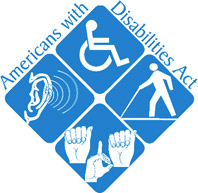Does the ADA Apply to Bank Websites and Apps?
The Americans with Disabilities Act (“ADA”) prohibits workplace discrimination against individuals with disabilities and requires the elimination of physical barriers to public locations. There is an unresolved legal issue as to whether the ADA’s existing language applies to websites. The applicable provision of Title III of the ADA provides “[n]o individual shall be discriminated against on the basis of disability in the full and equal enjoyment of the goods, services, facilities, privileges, advantages, or accommodations of any place of public accommodation by any person who owns, leases (or leases to), or operates a place of public accommodation.” 42 U.S.C. § 12182(a).
Recent litigation, brought by ADA accessibility law firms, addresses the issue of ADA compliance and  websites. There have been demand letters sent by these firms and there are cases pending on this matter. Since court decisions on this issue have been inconsistent, banks should look at guidance to determine compliance with this legal uncertainty.
websites. There have been demand letters sent by these firms and there are cases pending on this matter. Since court decisions on this issue have been inconsistent, banks should look at guidance to determine compliance with this legal uncertainty.
Neither the ADA nor its implementing regulations expressly refer to websites or provide any standards for web accessibility. The Department of Justice (“DOJ”) intends to adopt web accessibility regulations under the ADA, but rulemaking won’t commence until 2018 (per a recent DOJ announcement). Currently, there are standards known as the Section 508 Standards related to federal government websites and Web Content Accessibility Guidelines, to insure access to those with disabilities. Both sets of “standards” are technical methods that provide for alternative ways to “deliver a message”. Until DOJ guidelines are adopted or there is definitive case law, it remains an unresolved legal issue as to what extent the ADA’s general “public accommodation” applies to websites. As a compliance mandate, it is best for banks to review their websites, apps and other technology delivery systems with this ADA issue in mind. If your bank receive a demand from an ADA litigation firm, you should immediately forward this demand to counsel for resolution.